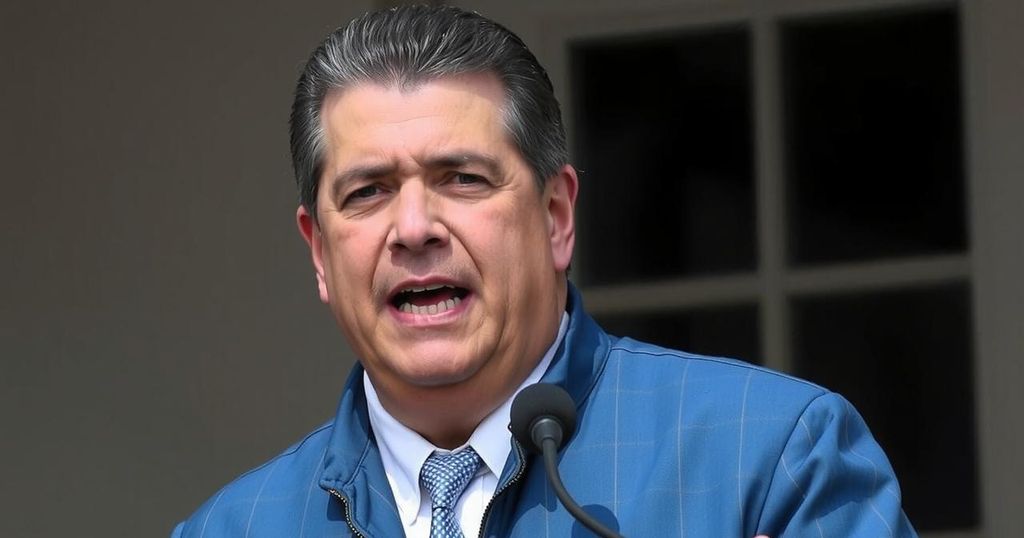Venezuelan Government Denounces U.S. Intervention as Maduro Prepares for Third Term

Venezuela’s government has rejected U.S. recognition of Edmundo González as president-elect, labeling it an outdated intervention tactic. Following this, Venezuela severed diplomatic ties with Paraguay for supporting González, highlighting regional political tensions. As Maduro prepares for his third term, the situation remains volatile with significant opposition protests planned, indicating a continuing struggle for political legitimacy and stability in the country.
The Venezuelan government has firmly opposed the United States’ decision to recognize Edmundo González Urrutia as “president-elect” ahead of Nicolás Maduro’s inauguration, decried as a tactic reflective of outdated intervention strategies. A communiqué from the Venezuelan Foreign Ministry stated that such actions represent an attempt to marginalize the true democratic will of the Venezuelan populace, asserting that the Biden administration’s legacy is one of failures both domestically and internationally. The Venezuelan authorities vowed to address any efforts perceived as threats to national stability with determination and dignity.
The communication also noted President Biden’s invitation extended to González for discussions focused on restoring democracy in Venezuela, a move juxtaposed against ongoing efforts to impose sanctions on Maduro’s regime for its alleged anti-democratic practices. Following a meeting, González disclosed that he has engaged with Trump’s advisors, expressing hopes for a strong relationship with the incoming administration. During his trip to Washington, González met various key political figures, further solidifying his position in opposition circles.
Tensions escalated following Paraguay’s diplomatic recognition of González, prompting Venezuela to sever ties with Paraguay, reflecting a deterioration in regional relations as the two nations navigate political allegiances and foreign influences. The backdrop of these events underscores the broader context of a divisive electoral atmosphere, where Maduro reportedly secured a victory over González, which was not honored by opposition leaders.
The political climate remains fraught with continued protests and the aftermath of alleged violence linked to electoral disputes, drawing attention to the deep political divisions within Venezuela. In a decisive move, the Venezuelan military has pledged to uphold Maduro’s presidency, vigorously denouncing González’s claims for support from armed forces. As both opposition leaders and government officials prepare for potential confrontations, the fate of Venezuela’s political landscape hangs in delicate balance as Maduro’s administration braces for a new term amidst rising tensions and external pressures.
The political scenario in Venezuela has been marked by deep divisions and conflicts, especially surrounding electoral legitimacy and external intervention. In July 2024, Nicolás Maduro claimed victory over opposition candidate Edmundo González Urrutia, a result which was immediately contested by anti-government factions. The Biden administration’s recent recognition of González as president-elect is seen as an attempt to challenge the Maduro regime, emphasizing a continued trend of U.S. foreign policy towards supporting opposition figures amidst accusations of electoral fraud and repression. This situation is compounded by reported violence following the elections, which has intensified the levels of unrest and civil disobedience. The ramifications of U.S. foreign policy and regional diplomatic tensions play critical roles in shaping the contemporary Venezuelan political landscape.
In summary, the Venezuelan government’s rejection of U.S. recognition of Edmundo González as president-elect underscores the tensions surrounding electoral legitimacy and external interference. The severing of diplomatic ties with Paraguay further exemplifies the fractious nature of regional politics in South America. As Maduro prepares for another term, the political landscape remains characterized by division and instability, with both the government and opposition poised for possible confrontations amidst a backdrop of unresolved electoral disputes and international scrutiny. The ongoing situation calls for close observation as it has potential implications for Venezuela’s future stability and governance.
Original Source: venezuelanalysis.com








